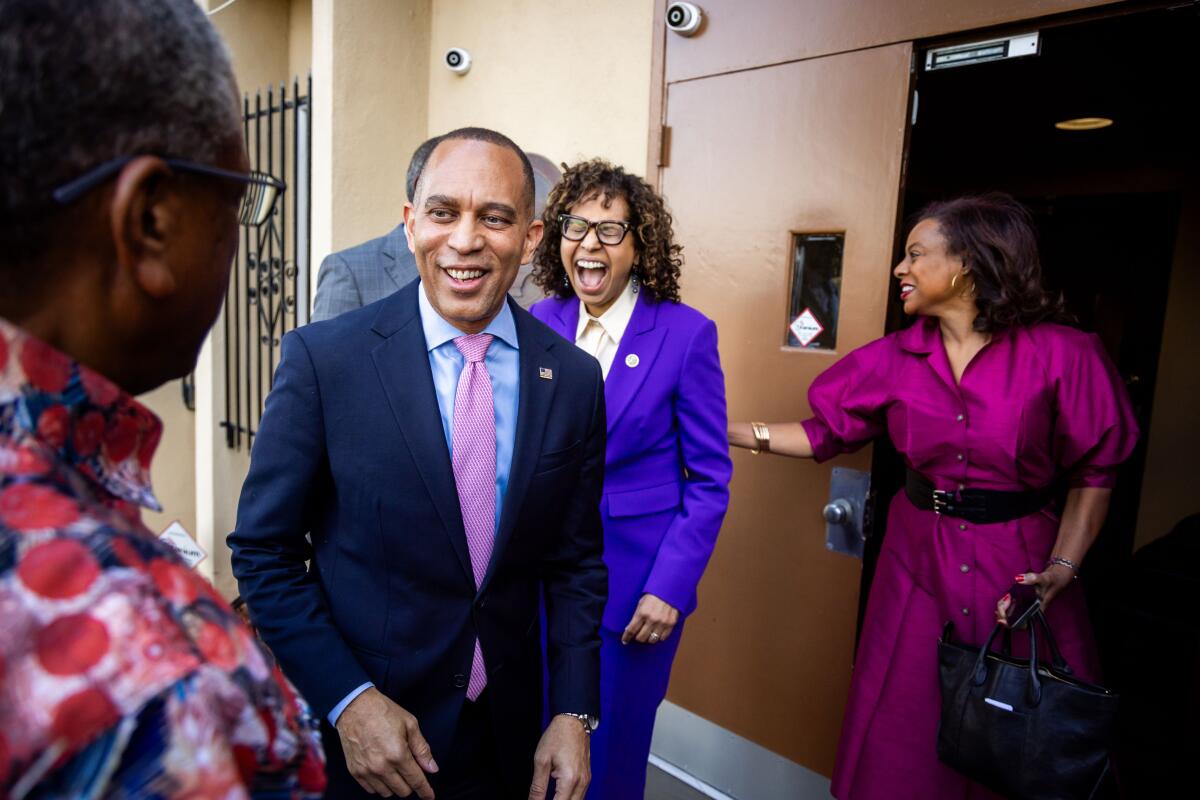Hakeem Jeffries campaigns for Proposition 50 at L.A.’s Black churches
U.S. House Minority Leader Hakeem Jeffries (D-N.Y.) visited three Black churches in Los Angeles on Sunday morning to campaign for California’s redistricting effort, which could add five or six Democratic representatives to his ranks.
Amid a congressional deadlock over healthcare subsidies that has left the government shut down for more than two weeks, the minority leader returned to the Golden State to campaign for Proposition 50. The ballot measure would give his party more power against Republicans, who Jeffries said have refused to negotiate in the shutdown and otherwise.
“This is trouble all around us,” Jeffries told the congregation at First African Methodist Episcopal Church of Los Angeles in West Adams — after poking fun at President Trump’s 2016 gaffe misspronouncing a book of the Bible. “Folks in the government who would rather shut the government down than give healthcare to everyday Americans. Wickedness in high places. And now they want to gerrymander the congressional maps all across the country to try to rig the midterm elections.”
The packed congregation — most wearing pink to support Breast Cancer Awareness Month — were receptive to his message.
“This is a way of trying to keep things equal,” said Kim Balogun, who was in Sunday’s crowd. “A level playing field.”
For many of its members, First AME is more than just a church. As the city’s oldest African American congregation, it has been at the forefront of the fight for civil rights since its founding in 1872.
“This is family,” said Toni Scott, a retired special-education teacher who has been with First AME for 52 years. “As one of the church’s previous ministers used to say, ‘This is a hospital. People are sick; we come to be healed,’” she said.
When news reached L.A. that Nelson Mandela would be released from prison, South African immigrants and anti-apartheid activists flocked to the church, anxiously awaiting the first sights of Mandela walking free. During the 1992 riots, First AME was a bastion of hope amid a sea of chaos.
“We thank you, God, for bringing us through dark times and chaotic times,” the Rev. Charolyn Jones said to the congregation on Sunday, “knowing that our church, the African Methodist Episcopal Church, was born out of protest.”
House Minority Leader Hakeem Jeffries, left, greets parishioners at First African Methodist Episcopal Church of Los Angeles. “It’s an honor and a privilege to spend time worshiping at Black churches here with Congresswoman Sydney Kamlager-Dove to reinforce the message of the importance of voting yes on Proposition 50,” Jeffries said.
(Ethan Swope / For The Times)
For Jeffries, the first Black person to lead a major political party in Congress, the West Coast trip amid a congressional impasse was important.
“The African American churchgoing community has always been the foundation of the Black experience in the United States of America,” Jeffries said, who also visited the congregations of Mt. Sinai Missionary Baptist Church in South L.A. and Resurrection Church of Los Angeles in Carson. “It’s an honor and a privilege to spend time worshiping at Black churches here with Congresswoman Sydney Kamlager-Dove to reinforce the message of the importance of voting yes on Proposition 50.”
The state’s redistricting effort, Proposition 50, is part of a national fight over control of the U.S. House of Representatives, instigated by President Trump. Republicans hold a slim majority in the House, but in June, Trump began pushing Texas Republicans to redraw the state’s congressional maps to yield five more likely GOP seats.
In response, Newsom proposed California temporarily depose of its independent redistricting commission, led by 14 citizens, to redraw the state’s maps and add five Democratic seats, effectively canceling out Texas’s move.
The Democratic-controlled state Legislature quickly produced redrawn maps and scheduled a Nov. 4 special election to put them up for a vote. Mail-in ballots are already in the hands of voters.
California Republicans, including former governor Arnold Schwarzenegger, have slammed the initiative as a “big scam.” Schwarzenegger called Democrats hypocritical, arguing that while they call Trump a “threat to democracy,” they want to “tear up the Constitution of California” and “take the power away from the people and give it back to the politicians.”
Jeffries noted that California was letting its citizens ultimately decide — unlike some Republican-led states.
“We said from the very beginning that we want to find bipartisan common ground whenever possible, but unfortunately, Republicans, from the beginning of this presidency, have adopted a take-it-or-leave-it, go-at-it-alone strategy,” he said, which is part of why, he added, Proposition 50 is so important.
In the current shutdown, Democrats said they will not vote for a funding bill unless it extends tax credits in the Affordable Care Act that are set to expire for many Americans at the end of the year and reverses cuts to Medicaid that Republicans passed in July’s so-called Big Beautiful Bill.
If the ACA credits expire, premiums would on average more than double for Americans on the enhanced tax credit, one health policy research firm found. But Republicans point out they come with a price: The Congressional Budget Office estimates they would cost the government $350 billion over the next decade.
The bill, which is now law, will cut Medicaid spending by $793 billion, the CBO estimated, and lead to 7.8 million Americans losing their insurance.
On the government shutdown, Richard Balogun, a member of Sunday’s First AME congregation, thinks fighting for healthcare is a worthwhile cause.
“Isn’t it amazing that in England, Australia … you can have national healthcare? Maybe you don’t get treated within the first hour, but you get treated,” he said. In America, “you have to ask yourself sometimes, if I’m going to the emergency room, can I afford that thousands of dollars I’m going to have to pay? That should not be the case in this country.”
A government shutdown has consequences: 2.3 million civilian federal employees are going without pay — roughly 750,000 of whom are furloughed. When the employees are back-paid after the government reopens, that’ll correspond to roughly $400 million of taxpayer money spent every day of the shutdown to pay employees who were not working, the CBO estimates.
Beyond National Park closures and air travel delays, food programs for low-income families could run dry without a funding bill. The Women, Infants and Children Program (WIC) can see effects as soon as one week after a shutdown, the CEO of the National WIC Assn. said. Meanwhile, SNAP (formerly known as food stamps) could also run out of funding further down the line.
Republicans blame Democrats for shutting down the government over their healthcare concerns, but Jeffries pinned it on Republicans, who’ve refused to negotiate.
To Scott, the pink her congregation was wearing to support breast cancer survivors only emphasized the importance of access to healthcare. (Jeffries sported a pink tie.)
“More people need to know what’s going on, so just having him go from church to church, mostly in the Black neighborhoods — that’s where we have the most people: in our churches,” Scott said. “Some may hear the word, see something on fake news, but we know in the church you’re going to hear truth.”



